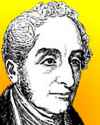 (source)
(source)
|
Henry Fourdrinier
(11 Feb 1766 - 3 Sep 1854)
English inventor of paper-making machinery known by his name, which is still at the core of modern continuous production equipment.
|
Henry Fourdrinier - Patent 2950

24 July 1806
Henry Fourdrinier
“A machine for cutting paper on a different principle from any hitherto used.” This cutting machine consists of a knife set in a frame which is caused to move up and down by means of a screw; the screw being actuated by a handle and intermediate wheels. The paper to be cut (say a ream in thickness) may be placed on a roller above a horizontal frame or table, or on the table itself, over which bas been stretched a moveable web which may be an endless web caused to revolve round rollers placed at each end of the table, or it may be unwound from one roller and wound on the other; and on the travelling web, and travelling with it, are placed a number of blocks or pieces of wood upon which the knife descends and cuts the paper to the desired size.
- 11 Feb - short biography, births, deaths and events on date of Fourdrinier's birth.
- The Fourdrinier Paper-Making Machine - from Paper Manufacturing in the United States (1916).
- The Fourdrinier Paper-Making Machine - from Paper & Paper Making Ancient and Modern (1863).
- Fourdrinier Patent 2951 (1806) - Method of making a machine for manufacturing paper of an indefinite length, laid and wove, with separated moulds.
- Fourdrinier Patent 3068 (1807) - Making paper by means of machinery.
- Henry Fourdrinier Biography - from Dictionary of National Biography (1889).
- Henry Fourdrinier Obituary from Gentleman's Magazine (1855).
- 24 Jul - events for date of patent on Paper-Making Machine.




